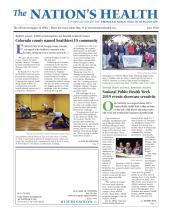New competencies available for population health workers
A new set of skills for population health professionals aims to help strengthen the connections between public health and health care workers.
Released in March by the Public Health Foundation, “Competencies for Population Health Professionals” is designed for hospital, health system, public health, health care and other professionals engaged in assessing population health needs and in improving population health programs, services and practices.
The new competencies, which are based on the foundation’s “Core Competencies for Public Health Professionals,” can be used to guide a number of efforts and activities, such as the creation of training materials, academic curricula, job descriptions and performance objectives.
The foundation is offering two training plans through its Train Learning Network to support the new competencies — one on the social determinants of health and another on health equity.
For more information, visit www.phf.org.
GAO: Inspections for low-income housing need improvement
Gaps in the federal inspection system for subsidized housing could put the health and safety of tenants at risk, according to a new report from the U.S. Government Accountability Office.
In a March report, GAO researchers reviewed processes within the U.S. Department of Housing and Urban Development’s Real Estate Assessment Center, which contracts with on-the-ground inspectors to ensure subsidized housing is safe, clean and in good repair. The GAO report, “HUD Should Improve Physical Inspection Process and Oversight of Inspectors,” found a number of gaps in the inspection system. For example, the Real Estate Assessment Center has not conducted a comprehensive review of its inspection process since 2001, even though new housing risks have emerged, such as property owners misrepresenting housing conditions.
The GAO report also found that the center does not verify the qualifications of contract inspector candidates before they begin formal training, nor does the center track progress toward meeting its inspection schedules. GAO reported that the center has not met its own target of conducting three quality assurance reviews of poor-performing contract inspectors per quarter.
For a copy of the report and its recommendations, visit www.gao.gov.
New recommendations target opioid addiction among American Indian and Alaska Native women
A new set of clinical recommendations is aimed at helping providers offer better care for American Indian and Alaska Native women struggling with opioid addiction.
Released in March by the Indian Health Service and American College of Obstetricians and Gynecologists and created in partnership with tribes, the recommendations are designed to support efforts in urban and rural communities and address the needs of pregnant women with opioid addiction, as well as those of their babies and families. American Indian and Alaska Native women currently face the highest risk of dying from a prescription opioid overdose.
The new recommendations focus on universal screening, medication-assisted treatment, prenatal and postnatal care, and recovery.
“These new recommendations are part of our comprehensive strategy to address the opioid epidemic in partnership with American Indian and Alaska Native tribes and communities,” said Michael Toedt, MD, chief medical officer at IHS, in a news release. “American Indian and Alaska Native women of childbearing age receive enhanced treatment and care when clinicians are culturally responsive to each patient.”
For more information, visit www.ihs.gov.
- Copyright The Nation’s Health, American Public Health Association









